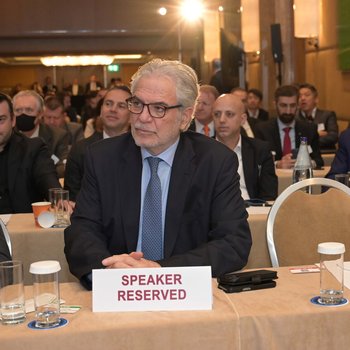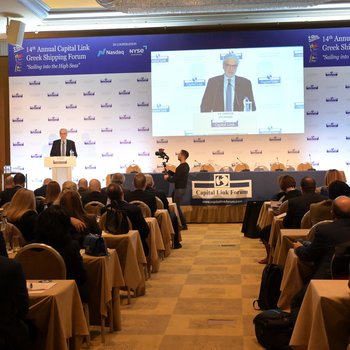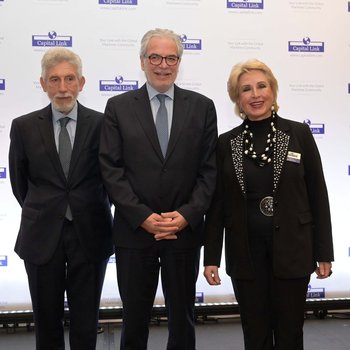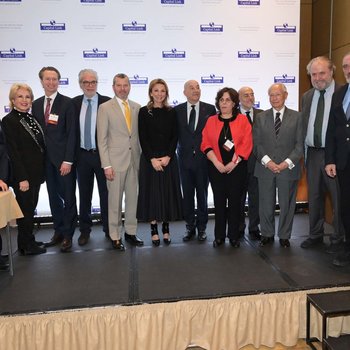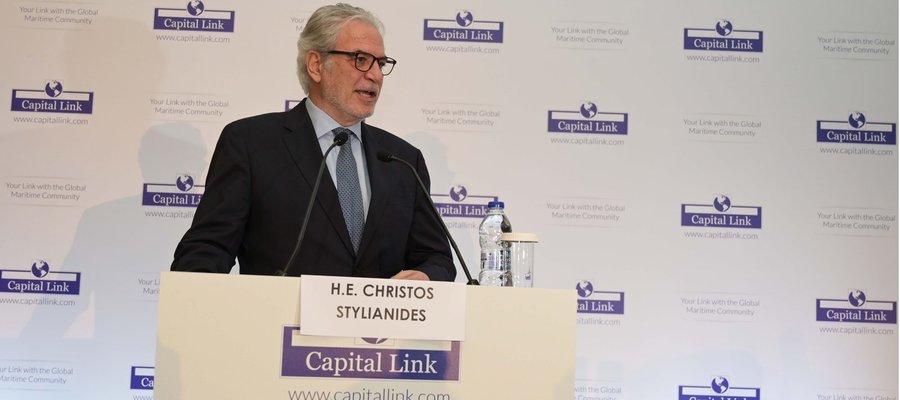
Dear IMO Secretary General,
Dear President of the Greek Shipowners Union,
Distinguished Representatives,
Ladies and gentlemen,
It is a great pleasure to address this year’s Annual Capital Link Greek Shipping Forum.
Let me first thank the organizers – and Mr. Bornozis - for this kind invitation.
And for the opportunity to address distinguished members of the Greek and international shipping community.
The title of this year’s conference “Sailing into High Seas” is especially appropriate in today's context.
Considering the international geopolitical volatility and the recent developments in the Red Sea, it captures the essence of present challenges for the maritime industry.
Particularly the challenge of maritime security.
This kind of aggression - in one of the most vital shipping lanes - threatens not only the regular flow of world trade.
But also, the safety of vessels and most importantly, the wellbeing and even the life of innocent people on board.
It is an unacceptable breach of international law which violates the freedom of navigation.
From the start of this conflict, the Greek government condemned strongly the attacks. We took immediate action.
Greece – one of the world’s largest ship-owning nation – not only has a fundamental interest to preserve the freedom of navigation and the protection of the lives on board.
It is our responsibility. Our duty to do so.
And as the Minister of Maritime Affairs and Insular Policy of Greece, I can assure you that we stand firm on this principle.
Ladies and Gendlemen,
Greece lives by the sea, for the sea, because of the sea. It is in our DNA.
The maritime sector is one of the most robust and promising sectors of our economy.
A sector which supports our country’s sustainability and growth.
With a fleet of over five thousand and five hundred (5.500) vessels, Greek shipowners control twenty one percent (21%) of the global dead-weight tonnage.
The Greek fleet is an essential factor for the world economy to keep moving.
It is also vital for the EU.
Representing more than sixty percent (60%) of the EU fleet, the Greek-owned fleet plays a crucial role in securing EU’s energy needs.
And this is particularly important, given the ever increasing energy security concerns.
Dear friends,
The times are challenging.
And shipping faces a fiercely competitive and volatile international environment.
To ensure the sustainability of the maritime sector, we need to see the upcoming challenges as “opportunities”.
Let me explain, using the example of decarbonisation.
Shipping’s transition to the “carbon-free” era presents the sector’s greatest challenge today.
It is a radical change ahead. No doubt.
Nevertheless, we - the Hellenic Ministry of Maritime Affairs & Insular Policy and personally me – as the Minister – believe that this challenge can be turned into an opportunity.
An opportunity to “move forward” and ensure the sustainable growth of the shipping sector.
More importantly, it is an opportunity for Greek – and overall EU shipping - to maintain or even increase its global competitiveness.
This is a particularly crucial point.
Especially when we consider the turbulent times we are living in, and that Europe is losing its overall competitiveness.
As you are all well aware, the political commitment towards decarbonization in shipping is there.
The IMO landmark Strategy on the reduction of Greenhouse Gas emissions from ships is now in place.
It provides the framework. And it paves the way for the transition.
From my experience I can say that “there is a lot of green momentum now at the IMO”.
And I am sure the Secretary General of IMO, who is here with us today, can confirm this.
Decarbonisation is very high on the agenda.
As you know, the European Commission published a new Communication on 2040 climate target, which considers differentiated targets for shipping aligned with the IMO Strategy and tries to address the crucial issue of shipping access to alternative fuels.
What we need to do now, is to clear the path in terms of implementation.
And Greece will play a leading role in that front.
We will be at the forefront throughout the whole process – in the IMO or in Brussels – towards the development of mid and long-term measures which will lead us to “carbon neutral shipping”.
As Prime Minister Mitsotakis said “We need radicalism, as well as realism”.
And we advocate for applicable solutions at a uniform level.
For net-zero shipping to become a reality, we need to ensure the worldwide availability of safe and affordable low and zero carbon fuels.
Without the fulfillment of this condition, our goal of decarbonizing shipping is not only uncertain but it will not prove feasible.
We need to intensify our efforts.
And to do so, the number one priority should be Collaboration.
And in particular, Cross-Sectoral collaboration.
The issue of fuels and new technologies in shipping is multidimensional.
We need to link the energy sector with the maritime value chain.
Energy producers and suppliers, port operators, logistics companies, charterers, engine manufacturers, and of course ship-owners need to collaborate.
To discuss transparently.
And to create a predictable environment which will “clear” the technological path to decarbonization.
And of course, we need science.
To collaborate with the scientific community, Research Institutes and Centers, to develop realistic solutions.
It is a certainly not an easy task, but we - as politicians - need to provide incentives, facilitate and promote such discussions at ALL levels. At sea At port At the level of policy At the level of technology and innovation
Our Ministry has started this process and has put in place an informal Advisory Committee to do exactly this.
This brings me to the second issue I want to highlight – finance.
No doubt, the investments needed to decarbonize shipping are costly.
Reducing vessel source pollution and enhancing the energy efficiency, both require substantial capital.
In this respect, I believe a blend of public and private financing needs to be examined more thoroughly.
The idea of Public-Private Partnerships can suit well in this framework.
PPPs can leverage the finance needed and at the same time facilitate knowledge exchange and technology transfer, accelerating the deployment of innovative solutions.
They can provide the framework where finance is generated, and collaboration is promoted.
This is the direction we need to follow.
By promoting such “win-win” solutions.
Last but not least, no “Sailing in High Seas” can exist without human capital.
Our seafarers.
Shipping employs millions of people on board and onshore. It creates meaningful career opportunities for young people.
Shipping cannot exist without skilled professionals.
Our seafarers are a wealth of knowledge and expertise. And they should be protected and well-trained.
In this respect, the Ministry of Maritime Affairs has declared 2024 as “The year for Maritime Education”.
We are putting forward several initiatives aiming to enhace the maritime profession overall. To attrack more young people and increase the available manpower.
Dear friends,
I am sure we all agree that we need efficient, sustainable and thriving shipping. In Greece. In Europe. In the world.
To that end, we should remain together and cooperate closely to transform our commitments into tangible deliverables. Collective action is a must.
Before closing, I want to take this opportunity and invite you all to the Ninth “Our Ocean Conference” which will be hosted in Athens, between 15-17 April.
It is a major forum for dialogue which will bring together governments, international organizations, academia, the private sector, and NGOs that share a common vision for the protection of the oceans.
I wish every success to the “14th Annual Capital Link Greek Shipping Forum”, the results of which I am sure will provide us with useful insights and constructive proposals for our maritime future.
Thank you once again for your attention.


